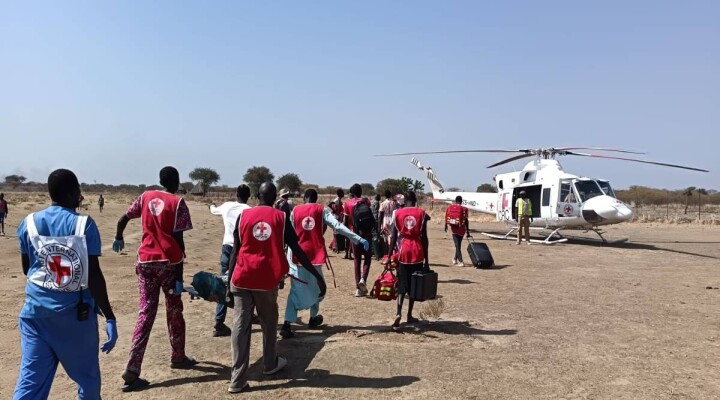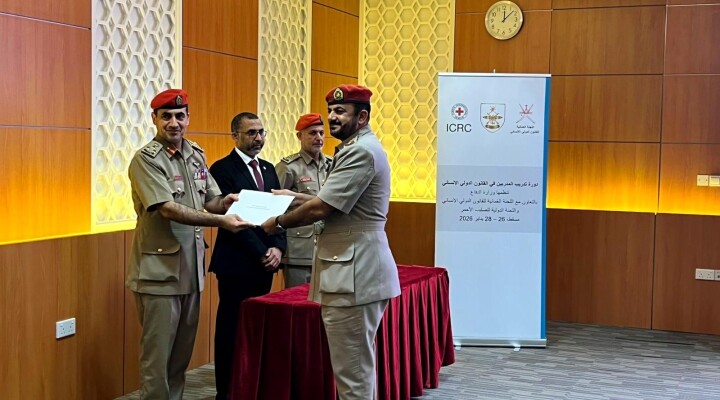Yemen: Deadly spike in hunger and child malnutriton
Child malnutrition is increasing in Yemen, according to the most recent analysis of health centres supported by the International Committee of the Red Cross.
Of more than 56,000 children under the age of five treated last year (January to November), more than a quarter were suffering from acute malnutrition. More than 4500 children were so severely malnourished it was life-threatening and required immediate treatment.
It’s estimated 20 million people can’t find or afford enough food in Yemen today, with 3.2 million children and women acutely malnourished.
More than 2.25 million cases of children aged 0 to 5 years and more than a million cases of pregnant and lactating women are projected to suffer from acute malnutrition this year, according to the IPC, the global system for classifying the severity and magnitude of the food insecurity and malnutrition situation.
“Most of the cases we receive monthly suffer from malnutrition. People are in difficult circumstances, they have no jobs, their income is low, can barely provide for their families, so they don’t have the means to be get medical treatment”, said Mai Abdul Rahman, a nurse in the Nutrition Department at Kapota Health Center in Aden.
The past few years have seen a spike in the number of Yemenis – adults and children - suffering from hunger. Although malnutrition existed in Yemen in the past decades, the current situation is the result of protracted conflict, economic collapse, soaring food prices, a broken health system, restrictions on imports, loss of employment opportunities, displacement and the impact of the global COVID 19 pandemic.
Internally displaced people are extremely vulnerable, having lost homes and livelihoods and often having to travel longer distances to find medical help. The health condition of the patients – including malnourished children who easily develop medical complications – often worsens before receiving treatment, leading to a higher mortality rate.
“We receive many cases of malnutrition, which vary between moderate and severe; most of them are displaced people. They can hardly provide a living, let alone buy medicines”, said Fahad Al Hammadi, Head of Nursing and Emergency Department in Taiz.
Among the immediate causes of malnutrition, poor food consumption, both in quantity and in quality, plays a major role. Two thirds of Yemeni households cannot afford a sufficient diet, while less than 50% of children have a satisfying level of minimum dietary diversity. The cost of living has skyrocketed since the conflict began. The price of a food basket (rice, lentils, milk, flour, beans, cooking oil, sugar, salt) has increased by 60% since the conflict began six years ago.
“If flour is available, we make bread and eat it with tea. Our biggest worry is going hungry; we have children that cannot bear it”, said Hamed Abdo, a labourer and father of four.
An estimated 80% of Yemen’s population - or 24.1 million people out of a population of 30.5 million – need humanitarian assistance, with more than 14 million people are in acute need.
ICRC Response:
The ICRC supports the screening and treatment of moderately malnourished children with Ready-to-Use Supplementary Food. As a high proportion of patients relapse less than six months after recovery, due to the lack of economic resources, upon recovery all patients receive a food-oriented cash grant to prevent such relapse.
Existing antenatal care is supported with the provision of mosquito nets, medicines and medical items in order to provide adequate care to pregnant women.
In both frontline and resettlement areas, the ICRC brings relief to internally displaced persons, residents, and returnees through a program of unconditional cash grants in order to buy food and basic items, while sustaining the local markets.
In areas where, due to the conflict, markets are disrupted, the ICRC distributes food; for households with young children, food baskets include Ready-to-Use food supplements to prevent malnutrition.
The ICRC supports livelihood activities including: agriculture, livestock, fisheries, beekeeping, and support to diverse micro-economic initiatives.
The ICRC supports mothers of young children for in-house, small-scale, self-consumption-oriented food production, such as gardening activities, to improve the diversity of diet and prevent both acute and chronic malnutrition.
The ICRC has been supporting 83 primary health centres and hospitals across the country with medications, medical equipment and incentives for health workers, more specifically in governorates dogged by the ongoing violence such as Taiz, Hodeida, Aden, Sa’ada.
During 2020, a total of 845’461 consultations were carried out. This included 52’179 Antenatal care consultations, 8’853 deliveries, and 79’751 Growth Monitoring consultations
SHOTLIST
Production Reference: 20210325-Yemen-Malnutrition
Location: Yemen
Filming Date: March 2021
Producer: Wagdi Almaqtari
Camera: Taha Saleh, Onsy Hesham, Qusai Almoyad, Mohammed Alsayaghi
Editor: Wagdi Almaqtari
Copyright: ICRC
Restrictions, if any: None
Duration: 07:28



For more information and interview requests please contact:
Basheer Al Selwi, ICRC Sanaa, balselwi@icrc.org ,+967 771 480 412
Sara Alzawqari, ICRC Beirut, salzawqari@icrc.org , +961 31 38353
Ruth Hetherington, ICRC Geneva, rhetherington@icrc.org , +33 6 33 288823



